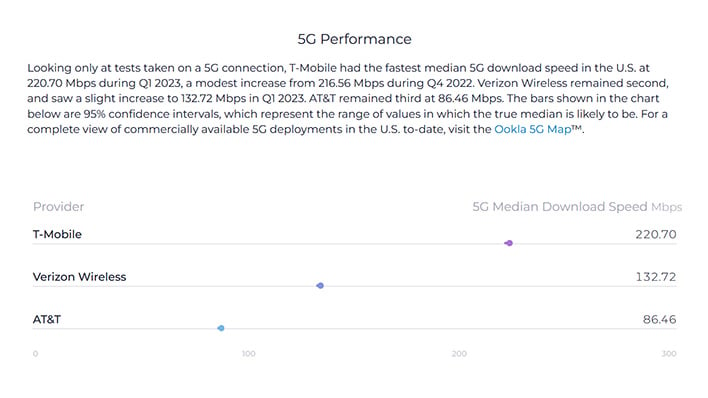Ookla (the maker of Speedtest.net) reports that T-Mobile
still holds the highest 5G median download speeds in America, and significantly outperforms its two biggest rivals, Verizon Wireless, and AT&T. According to real-world speed tests conducted during Q1 2023, T-Mobile users averaged an impressive 220.70Mbps, while Verizon Wireless and AT&T averaged just 132.72Mbps and 86.46Mbps respectively.
The report it shared not only shows average median speeds, but the overall behavior of the 5G network as well. Including latency tests, video streaming performance, and more. T-Mobile was not only the fastest 5G network, but it was also the most reliable and responsive network of the three. In regard to general median download speeds, incorporating not just 5G but 4G LTE and other network broadband cellular standards still online today, T-Mobile averaged 165.22Mbps.
Verizon Wireless came in second with a 75.40 Mbps average and AT&T in last place with 68.20Mbps.
Unsurprisingly, upload speeds also show the same behavior, T-Mobile performed the best with 12.99Mbps, Verizon with 9.87Mbps, and
AT&T with 8.14Mbps. Median Multi-Server Latency also shows a win for T-Mobile topping out at 55ms of latency. Verizon again comes in 2nd with a slightly longer 57ms latency, and AT&T fades to third place again with 60ms. Consistency, or the overall reliability of the network, was fairly close between the three, but all three still hold the same hierarchy. T-Mobile comes out on top at 87.3% consistency, Verizon at 83.5%, and AT&T at 81.6%. These are just a few of the results Speedtest shared for its Median March 2023 results.
It’s no coincidence that T-Mobile has the
best overall connectivity today, especially when it comes to 5G reliability. When T-Mobile merged with Sprint three years ago, T-Mobile acquired all of Sprint’s pre-existing 2.5GHz wireless capabilities, which it immediately repurposed to use for its 5G network. This allowed T-Mobile to leapfrog its competitors in 5G deployment since it didn’t need to build brand-new infrastructure to support the new 5G standard.
Verizon and AT&T are still building out their own 5G infrastructure to this day. On top of this, both carriers also had to buy additional C-band radio frequencies from the FCC to maximize their 5G capabilities, adding further delays to their 5G deployment.


